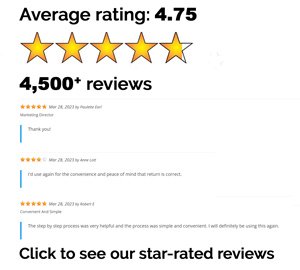The information in this article is up to date for tax year 2023 (returns filed in 2024).
Many students need additional financial support to get through school. The federal government provides several options for financial assistance, which students can apply for through the FAFSA. If you’re eligible though, is your financial aid taxable?
Here’s what you need to know about FAFSA and taxes.
What is FAFSA?
The Free Application of Federal Student Aid (FAFSA) is an application form students can complete to determine eligibility for student aid from the government. The government has a variety of financial assistant programs, including scholarships, grants, student loans and work-study programs offered through FAFSA.
How does FAFSA affect my taxes?
Is your federal financial aid taxable? In short: it depends. Each type of financial aid has different tax obligations.
Student loans taxes
Student loans are not counted toward your taxable income as they will be repaid.
Additionally, under the American Recovery Act, student loan debt that is forgiven is tax-free at the federal level through 2025 (state taxes may still apply).
Student loans forgiven or canceled based on your choice of career are also tax-free.
Grants and scholarships taxes
If you are awarded a scholarship or grant as part of your federal student aid award, they typically do not have to be repaid like student loans. Plus, you may be able to use those funds entirely tax free.
To keep your grants and scholarships tax free you must follow these simple guidelines:
- You must be pursuing a degree at your school or a training program for specific types of employment.
- The money must be spent only on tuition, books, supplies, fees, and equipment required for school courses.
- You cannot use the funds for school-related travel expenses or room and board.
Any funds you use for non-approved expenses must be reported on your tax return as taxable income.
For example, if you receive a $10,000 grant and use $8,000 on tuition and $2,000 on room and board, that $2,000 is taxable and must be reported as income on your tax return.
Additionally, if your grant or scholarship has teaching or research requirements, any money you make for that work is taxable.
Pro Tip: You may be able to save more on taxes by spending a portion of your grants or scholarships on non-qualified expenses. That will then count as taxable income to qualify for educational credits that lower your tax bill. In other words, any non-grant or scholarship money you spend on remaining qualified educational expenses may make you eligible for a tax credit under the American Opportunity Credit.
Work-study program taxes
Work-study programs are part-time, on-campus jobs designed to reduce your tuition costs. However, the income you earn through the work-study program is subject to state and federal taxes. FICA taxes will also be withheld from your paychecks unless you are enrolled in college full-time and only work part-time (less than 20 hours a week).
Note: Work-study programs are not the same as regular part-time jobs. If you are not awarded work-study as part of your financial aid package, any income you earn from a part-time job will be taxable (and could impact your financial aid eligibility when you submit your FAFSA form).
Tax breaks for student loans
Tax credits and deductions for education expenses can further reduce your tax burden come tax season. Here are a few options you may be eligible for.
Student tax credits and deductions:
- American Opportunity Credit: This credit allows you to claim up to $2,500 for qualified education expenses.
- Lifelong Learning Credit: This credit allows you to claim up to $2,000 for qualified tuition and related educational expenses. Students must be enrolled in an eligible institution and pursuing an undergraduate, graduate, or professional degree courses–including course to improve or acquire job skills.
- Student loan interest reduction: If you paid student loan interest, you can claim a tax deduction on your return for up to $2,500.
Financial aid and taxes FAQ
What is taxable income?
Taxable income is your gross income minus any exemptions, deductions or credits. Reducing your taxable income reduces your overall taxes owed. Understanding this can help you make strategic decisions about what financial aid you apply for and how you use any funds you’re awarded.
Do I have to pay taxes on student loans?
No. Student loans are tax-free and you don’t need to report them on your tax return. Additionally, student loan forgiveness However, you may have to report settled student loan debt.
Do I have to pay taxes on federal grants?
Generally, no. Federal grants like Pell grants are tax-free when applied to any qualified educational expenses. If you use a portion of the grant money for non-qualified expenses, those funds will count as taxable income on your tax return.
Do I have to pay taxes on student financial aid?
Your tax liability on financial aid depends on the types of financial assistance you receive, specific stipulations on the funds, and how you spend the money. Typically, grants and scholarships are tax-free as long as they are put towards qualified educational expenses. Any portion of the funds used on non-qualified expenses must be reported as taxable income on your tax return.
Don’t get schooled by your taxes this season. Let ezTaxReturn help! With ezTaxReturn, simple federal returns are free to file. Use our intuitive, step-by-step guide. Questions? We offer free customer support to get you answers fast.
Start your return today and get the maximum refund, guaranteed.
The articles and content published on this blog are provided for informational purposes only. The information presented is not intended to be, and should not be taken as, legal, financial, or professional advice. Readers are advised to seek appropriate professional guidance and conduct their own due diligence before making any decisions based on the information provided.




